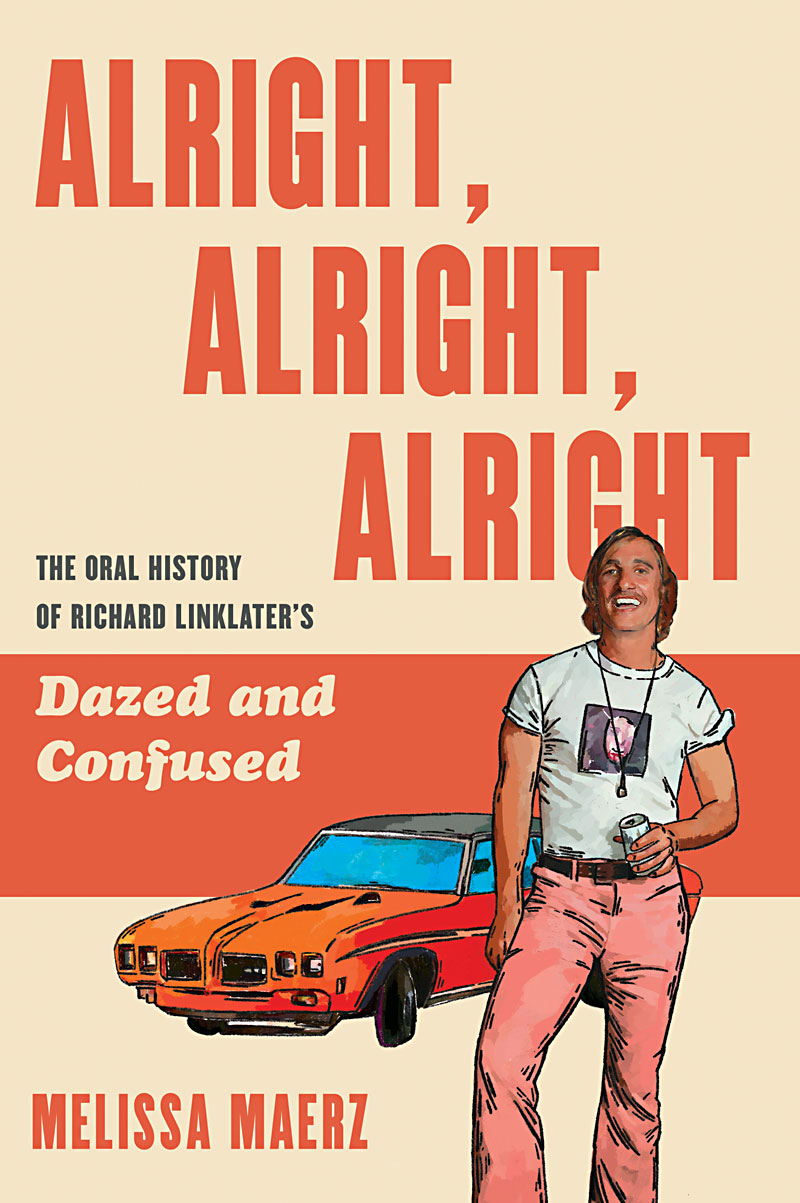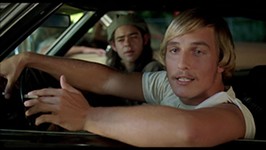Transcribing the Oral History of Dazed and Confused in New Book Alright, Alright, Alright
Melissa Maerz wrangles a class reunion
By Richard Whittaker, Fri., Nov. 13, 2020
Dazed and Confused is not just a film about Austin and made in Austin; it's very definitely an Austin film. So when Melissa Maerz started researching Alright, Alright, Alright: The Oral History of Richard Linklater's Dazed and Confused, she made sure to interview a host of Austinites alongside the A-list stars of Linklater's second movies. That litany of local figures even includes veterans of the Chronicle on the ground at the time – founder and future Linklater biographer Louis Black, and longtime Screens Editor Marjorie Baumgarten. When it comes to this film, Maerz said, "I feel like The Austin Chronicle has the ultimate word."
The relationship between Dazed and Austin continues this week as Linklater and Maerz hold a virtual signing and Q&A for her book, courtesy of Austin Film Society and BookPeople. Before then, we at the Chronicle should also probably throw in a mea culpa. Chapter 30 of the Vulture founding editor's deep, deep dive into the origins, production, reception, and reappraisal of Linklater's story of high schoolers mentions an infamous incident. In 1990, the Chronicle asked Linklater to write a self-interview about how Slacker had become a success: Three years later, with his studio debut, we asked him to do the same for Dazed and Confused. What we published was the "Dazed Diary," a seven-page screed about the studio's complete failure to promote the film, or really understand what it was. As Maerz explained, "Universal was not supporting that movie like they were Jurassic Park."
The article was published "the week that the movie is coming out," said Maerz, who generously described it as "bold." However, it came at the end of a production that had seen the fiercely independent Linklater go toe-to-toe with the studio system. "For Rick, it was his first welcome to Hollywood movies – for better or worse," said Maerz. "He goes from Slacker where he's making this movie with his friends, calling all the shots, not even having to get licenses, to making this movie where he's micromanaged by the studio." At the same time, she noted, "[He] was very smart to stay and shoot in Austin, far away from Universal." At least he'd got to make the movie he wanted – and time, as shown by the continued interest in the film and now the publication of the book, has declared Linklater the victor.
But what was he trying to achieve? Maerz said that she'd read an interview with the filmmaker in which he has said he wanted to make "the ultimate anti-nostalgia movie." Now, not only is Dazed and Confused a time capsule about 1976 when it was set, but for original fans it's a time capsule from 1993 when it was released. That double-anchoring to teenage years fascinated her. "How," she wondered, "did this movie go from being an anti-nostalgia movie to a major nostalgia movie?"
Romanticizing the past – now that's a very Austin trait that the book originally tackled. Maerz said, "Believe it or not, there are about 200 pages cut out ... I feel bad about the people I left out." In that longer version, the specter of nostalgia reared its head with an old refrain that's familiar to anyone who's been in the ATX for more than five minutes. Maerz said there were "a billion quotes of people going, 'Austin's fine now, but you should have been here in the Nineties.' 'Austin's fine now, but you should have been here in the Eighties.' 'Austin's fine now, but you should have been here in the Seventies.'" That romanticization of Austin's past now reaches back to the shooting of Dazed: As cast member Renée Zellweger told her, "It was a time when, if you wanted to make a BMX skate park, you did it."
Yet was it the time, or the place? Linklater brought the can-do, don't ask permission energy that has defined Austin's creative scene for decades to the set: It's part of what lead to his clashes with the studio, but for Maerz it's part of why Dazed and Confused was so important for so much of the cast. "It was the first movie for a lot of them, and even for the ones who it wasn't they're first movie, it was the first one where they were able to contribute."
That was nearly all they took away because, at release, Dazed had all the makings of a career killer: barely making back its budget in the U.S., and caused nary a ripple internationally. It was the wrong film at the wrong time: After the weird ride of Slacker, arriving as the very word started to define a generation, Dazed was a period teen movie when the whole genre seemed moribund. "Even John Hughes wasn't doing high school at the time," said Maerz. Moreover, Linklater had gone through such a tonal shift that it induced whiplash in audiences. His first film was "a peek at that world that felt as fantastical as a Wes Anderson film today." His followup was glossy and packed with rising young stars – but, in hindsight, the absurdly loaded cast played a role in its eventual reappraisal.
Imagine, at any point in the last 25 years, pitching a studio on casting Zellweger, Rory Cochrane (Argo, Empire Records), Ben Affleck, Milla Jovovich, Anthony Rapp (Rent), Adam Goldberg (Saving Private Ryan), Jason Lee (Almost Famous), Joey Lauren Adams (Chasing Amy), Parker Posey, and Matthew McConaughey all in the same film, and just watch the budget explode. However, the reported death of the high school movie, as casting director Don Phillips explains in the book, meant every actor between 15 and 25 was looking for work. Maerz laughed at the proposal that there's an alternate universe in which Claire Danes, Mark Ruffalo, Wil Wheaton, Hilary Swank, and Brendan Fraser (all of whom auditioned) took familiar roles. After all, the cast is why the almost structureless Dazed works. "You're not watching it for the story. You're watching it to hand out with these characters." She recalled an anecdote from Quentin Tarantino, who had gone to Amsterdam to work on scripts, but ended up crippled by loneliness and writer's block. "He would just put on this VHS tape of Dazed and Confused, and he felt like he knows those people."
It was a sense of recognition, and it was something Maerz felt too. "There's a lot about DDazed and Confused that I could related to," she said, "but growing up in Portland, Oregon there was a lot that was separate to my high school experience." Some of it seemed almost absurd. "The paddling, I thought he must have made that up," said Maerz, adding that she had no idea "this was a thing that was happening in Texas until fairly recently."
So how did Dazed cut through the regional weirdness and gain its modern fanbase? For Maerz, it's summed up in what another fan told her: "Dazed and Confused was exactly my high school experience but the music was different, and the cars were different and the clothes were different." That's the key to Linklater's connection with the audience, said Maerz. "It's not about the details, it's about the vibe. He gets what it's like to be a teen." That included the complex emotions and relationships of growing up in a small town. When Maerz interviewed a lot of Linklater's old classmates from Huntsville High, she said, "A lot of them were natural storytellers, really smart, really funny, and I wondered how he could have this horrible experience, but gone to school with these people who just seemed so much fun."
The initial commercial failure of the film meant the audiences that discovered it later felt truly invested. The studio didn't tell them to watch it: Instead, Maerz said, "It was people passing around bootleg VHS tapes, and discovering it on their own." It meant they could build their own emotional connection. Maerz said, "There's a lot of people who watch it and go, man, I miss high school" – but there are just as many reminded of why they wanted to get out as fast as possible.
That's where the old game of wondering where the characters of Dazed and Confused would have gone next – and who would have followed Linklater to the mythical land of Austin. On that, Maerz is pretty positive. "The nerds in the car are going to Austin. Slater is moving to Austin."
AFS special streaming launch for Alright, Alright, Alright: The Oral History of Richard Linklater’s Dazed and Confused with Linklater in conversation with author Melissa Maerz (moderated by Andy Greenwald). Nov. 18, 7pm. Free for AFS members, $10 for nonmembers. Tickets at www.austinfilm.org.
Alright, Alright, Alright (Harper, $26.99 hardback, 464 pp: also available as ebook and audiobook) available from Nov. 17. A limited number of copies with bookplates signed by Linklater and Maerz are available from www.bookpeople.com.












